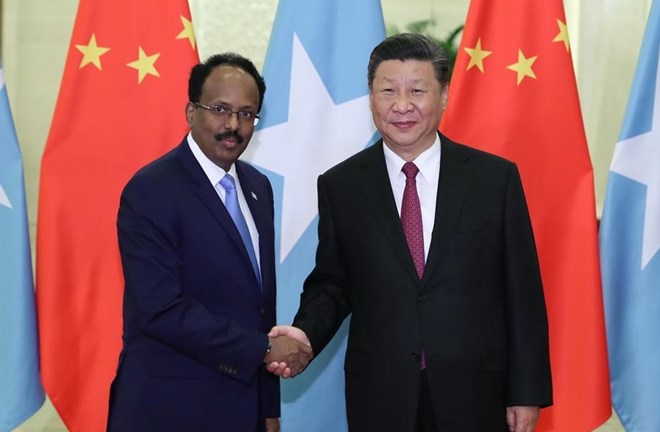By: Mohamed A. Suleiman
Friday - November 5, 2021
Friday - November 5, 2021

I read the opinion piece by China’s ambassador to Somalia, Fei Chengchao, entitled: “Distance, time no barrier to China-Somalia ties”, with a great deal of trepidation. On the surface, the article appears to herald a new era in China’s diplomatic initiative which is designed to appeal directly to the hearts and minds of the Somali people. However, it is incumbent upon every Somali citizen to examine and be aware of the nefarious interests that China has in our country.
An article by the prestigious magazine, The Economic Times, published in August 2021 succinctly points out that “China is one country which has been deliberately trying to project itself as a saviour and a good friend to all poor nations seeking aid and relief material. However, rarely as seen in other instances, has any extension of help from the Chinese been benign without any ulterior motives”.
Interestingly, the Ambassador wrote in his op-ed that: “today, as a result of natural disasters and conflicts, more than one-third of Somali people are in urgent need of humanitarian aid, and one-fifth are displaced. A new batch of Chinese humanitarian aid was recently handed over to Somalia and will soon be delivered to the vulnerable population. It comes at the right time for those in need”.
Interestingly, the Ambassador wrote in his op-ed that: “today, as a result of natural disasters and conflicts, more than one-third of Somali people are in urgent need of humanitarian aid, and one-fifth are displaced. A new batch of Chinese humanitarian aid was recently handed over to Somalia and will soon be delivered to the vulnerable population. It comes at the right time for those in need”.
However, in an article published by Forbes in October 2019, Wade Shepard argues that China has other plans for Somalia. He indicated that the Chinese are aware about its long coastline with extensive stocks of fish making it one of the richest fishing grounds in the region. Thus, to exploit tuna and other valuable species of fish off the Somali coast, China managed to arrange fishing licenses for up to 31 vessels to function in the region. Wade added that these vessels are related to the China Overseas Fisheries Association, a distant water trawling group created in 2012 to promote the Asian giant's competitive fishing edge abroad.
The article further highlights that China’s appetite for other natural resources is also expanding and that it is getting into mining directly rather than just importing what it wants. The author warns African countries to be aware of how the Chinese operate mines in Africa in an extremely mercantile manner without bothering about the harm to environment and the communities.
While the Chinese communist regime attempts to project an image of a humanitarian state, it is a well-established fact that that China has sinisterous motives about its involvement in Africa, and particularly in Somalia for that matter.
While the Chinese communist regime attempts to project an image of a humanitarian state, it is a well-established fact that that China has sinisterous motives about its involvement in Africa, and particularly in Somalia for that matter.
Therefore, it is a no coincidence that Ambassador Fei Chengchao wrote in his opinion piece that Somalia is known to have the largest number of camels and the sweetest bananas in the world, and that it also has the longest coastline on the African continent, as well as abundant fisheries and mineral resources. He asserted that, as such, China-Somalia cooperation has huge potential and a promising future.
The present day Chinese communist regime is an economic powerhouse that continues to give the western multinationals a run for their money. It a well-established fact that Chinese conglomerates are making the most of Africa’s cheap labor, natural resources, and need for infrastructure.
However, as has been revealed by many influential publications, how much those countries benefit; what political influence China gets from its investments; and the culture clashes that arise between locals and Chinese already living and working in African countries both large and small is hardly scrutinized.
Reports that the Somali government continues to cut clandestine deals and give sweetheart resource concessions to China have been surfacing over the past few years, and in fact, there are genuine concerns that the Somali government has already fallen victim to China's debt-trap diplomacy; a policy where the Chinese government offers huge loans to some African states and then allows that loan to be swindled by corrupt leaders. Once indebted economies fail to service their loans, they are pressured to support China's geostrategic interests and are also coerced to sign huge concessions in their resource management sectors to the Chinese government.
As such, the proposed marriage by the Ambassador between China’s debt-trap policy and the Somali government which Transparency International, which is a global civil society organisation leading the fight against corruption, consistently rates as the most corrupt government in the world is quite ominous.
On a more somber note, the Somali government should look itself in the mirror and reflect on why it should do business with a government that is waging a genocidal campaign against its Muslim minority group, the Uighurs, simply because of their Muslim identity.
The expression “buyer beware” which notifies a buyer that the goods he or she is buying are "as is," or subject to all defects is quite pertinent when it comes to dealing with today’s Communist China.
Mohamed A. Suleiman is a researcher and an educator and could be reached @ [email protected]
Mohamed A. Suleiman is a researcher and an educator and could be reached @ [email protected]